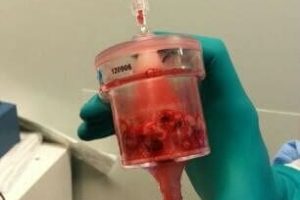coronary artery bypass surgery
‘Immortalized’ Cells Enable Researchers to Grow Human Arteries
In a combination of bioengineering and cancer research, a team of Duke University Medical Center researchers has made the first arteries from non-embryonic tissues in the laboratory, an important step toward growing human arteries outside of the body for use in coronary artery bypass surgery.
Surgery better than drugs for serious lack of blood flow to the heart
Surgery or angioplasty to improve blood flow in patients with moderate to severe levels of blood flow restriction to the heart reduces the risk of cardiac death more than medication alone, researchers report in today’s rapid access issue of Circulation: Journal of the American Heart Association.
Common Heart Surgery Drug Potentially Dangerous
Protamine, a drug used for more than 40 years immediately after coronary artery bypass surgery to return thinned blood to its normal state, has been shown to have more potential negative side effects than previously appreciated, according to researchers. Although they found that small blood pressure changes that often occur with protamine?s use are associated with increased mortality, they do not advocate any change in the clinical use of the drug. However, they do emphasize that their findings should spur development of alternatives for protamine.
Xenon Shows Promise in Protecting Brain During Bypass Surgery
In studies using rats, researchers from Duke University Medical Center and the Imperial College, London, have found evidence that the chemically inert gas xenon can protect the brain from the neurological damage often associated with the use of the heart-lung machine during coronary artery bypass surgery. The researchers say that xenon appears to block receptors on nerve cells in the brain that can be “overstimulated” in response to the surgery. This overstimulation can lead to nerve cell damage or death.
Age, Lower Immunity Put Bypass Patients at Risk for Cognitive Impairment
Older patients with lowered immunity to certain common bacteria found in the gastrointestinal tract are more likely than younger patients to suffer cognitive decline after coronary artery bypass surgery, according to a new analysis by Duke University Medical Center researchers.
Within the gut resides a class of bacteria known as gram-negative bacteria. These bacteria can release endotoxins into the bloodstream as a result of action of the heart-lung machine — which circulates the blood throughout the body while surgeons operate on a stopped heart — triggering a cascade of immunological events including systemic inflammation.

